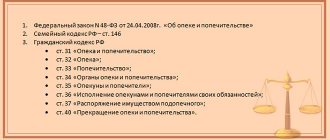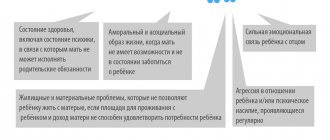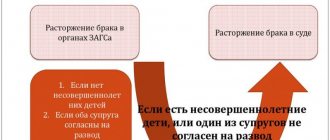Home/Guardianship
The divorce of parents leads many children to early psychological trauma, which can result in complications in the formation of the child’s personality in the future. The offspring physically needs the support of their father and mother. Conscientious parents can reduce the risk of harm to the psyche of a minor child if they continue to take part in the child’s life by obtaining guardianship in the event of a divorce. However, in practice, the desire of the father and mother is often broken by the pitfalls of legislation. To prevent this, it is necessary to study the subtleties and nuances of the procedure for securing the rights and obligations of parents in relation to a child upon divorce.
Attention! If you have any questions, you can chat for free with a lawyer at the bottom of the screen or call Moscow; Saint Petersburg; Free call for all of Russia.
What does child custody mean in a divorce?
When filing a divorce, the question arises as to which of the former spouses will be responsible for the child. Child custody involves (Chapter 20) the RF IC:
- care for minors;
- parenting;
- making decisions on matters related to the interests of the baby.
Also, the parent responsible for the child has the right to receive any information about the child from officials.
For your information
It is important to consider that the term “custody” when parents divorce, implies the designation of the rights of the mother and father to participate in the lives of the children. This clarification is due to the position of the legislation. So, taking into account clause 3 of Art. 31 of the Civil Code of the Russian Federation, guardianship is appointed exclusively in the event of deprivation of parental rights or other circumstances that prevent the fulfillment of duties by the father and mother.
Agreement is the best choice
Entering into an agreement on the terms of child custody is the best thing parents can do in a divorce situation. A civilized and peaceful solution to the issue will reduce the psychological consequences for the child and smooth out the negative impact of the divorce process.
Research by psychological scientists shows that the best choice for a child's mental health is joint custody. Children who are raised by both parents after a divorce experience fewer emotional disorders and their behavior differs less from the behavior of their peers. A child deprived of the opportunity to contact the other parent reacts more strongly to the situation of divorce and is more at risk of psychological trauma.
Until the matter comes to the intervention of a judge, parents are independent in determining the terms of custody and the degree of their detail. When the court takes over the case, the initiative of the former spouses will be limited by the point of view of the arbitrator. This does not mean that the parties are deprived of the right to make proposals, but the final word will remain with the judge. Voluntarily accepted obligations are more likely to be fulfilled voluntarily by both parties.
When developing the terms of the agreement, one should remember and observe the principle of the primacy of the interests of children over parental rights (See paragraph 1 of Article 65, RF IC). The child is a full-fledged member of the family. The actions and decisions of parents should always correspond to his interests. When approving the parents' agreement, the court will first of all check compliance with this principle (See paragraph 2 of Article 24, RF IC).
Both parents are required to comply with the agreement. State coercive measures can be applied to both the parent living with the child and the parent living separately. For violation of the right to communicate with a child, administrative liability is provided in the form of a fine in the range of 2,000 - 3,000 rubles. Repeated violation is punishable by a fine ranging from four to five thousand rubles or arrest for up to five days (See paragraphs 2 and 3 of Article 5.35 of the Code of Administrative Offenses of the Russian Federation). The last resort is the transfer of the child to the second parent (See paragraph 3 of Article 66, RF IC).
Normative base
In order to avoid difficulties that arise when establishing child custody when parents divorce, it is important to study the provisions of a number of legal documents:
- Federal Law No. -FZ of 2008. A key regulatory act that defines the features of guardianship and trusteeship.
- Art. - Civil Code of the Russian Federation. The basic procedure for appointing a guardian is established.
- Chapter 20 of the RF IC. The nuances of establishing a responsible person over children are prescribed.
Additionally, it is necessary to take into account the positions of other regulations that clarify the subtleties of the procedure for appointing a guardian for a child upon divorce of spouses. For example, Government Decree No. 117 of 2013, which sets out a list of diseases due to which a citizen will not be able to become responsible for the baby.
United States
Shared parenting Shared parenting is growing in popularity, and is especially common in Scandinavia. By 2016/17 the percentage in Sweden had increased to 28%; with 26% for children aged 0–5 years, 34% for the 6–12 year age group and 23% for older children aged 13–18 years. In a comparative survey of 34 Western countries conducted in 2005/06, the proportion of 11–15 year olds living in shared parenting arrangements, compared with sole custody, was highest in Sweden (17%), followed by Iceland (11%), Belgium (11%), Denmark (10%), Italy (9%) and Norway (9%). Ukraine, Poland, Croatia, Turkey, the Netherlands and Romania had 2% or less. Among English-speaking countries, Canada and Great Britain had 7%, and Ireland - 5%.
Co-parenting is growing in popularity. The incidence of shared parenthood versus sole custody varies by country, with it being most common in Scandinavia.
§ Legislation
Who will be the child's guardian after a divorce?
Upon divorce, parents must decide who will be responsible for the child. By decision of the former spouses or the court, the following may become a guardian:
- father;
- mother;
- both parents (joint).
In case of divorce and distribution of children, each of the former spouses may receive custody rights for a specific child. However, the parent may not always be allowed to see the baby. In Art. 35 of the Civil Code of the Russian Federation and Art. 146 of the RF IC establishes that a guardian must be recognized as a legally competent citizen over 18 years of age, whose biography does not contain a number of the following circumstances:
- deprivation of parental rights;
- having a criminal record that was acquired as a result of the intentional commission of a crime, the purpose of which is to cause harm to the life or health of a person;
- recognition of patients suffering from alcoholism or drug addiction;
- removal from the duties of a guardian;
- restriction of parental rights by court decision;
- deprivation of the status of “adoptive parent” through one’s own fault.
Also, a parent will not be able to become a guardian if they have diseases, the list of which is determined by Decree of the Government of the Russian Federation No. 117 of 2013:
- tuberculosis in persons from groups 1 and 2 of dispensary observation;
- substance abuse in addition to drug addiction and alcoholism, which were noted earlier;
- malignant tumors of stages 3 and 4 (neoplastic tumors of stages 1 and 2 before treatment);
- illnesses and injuries that caused the assignment of 1st group of disability;
- mental disorders;
- infectious diseases until completion of dispensary observation.
When appointing a guardian, the characteristics specified in paragraph 2 of Art. 146 RF IC:
- moral and personal qualities of a person who wants to be responsible for a child;
- the ability of the guardian to fulfill his duties, that is, to positively influence the development of the baby;
- relationship between parent and child.
IMPORTANT
In addition, when establishing custody in a divorce, it is also necessary to take into account the opinion of the child himself, who has reached the age of 10 (Article 57 of the RF IC).
The impact of divorce on children's psyche
Spouses who have decided to divorce must remember that divorce will affect not only the future of their child, but also his mental state. And in what direction - for the better or for the worse - it depends only on the parents. So, if parents live together only for the sake of the child, maintaining the appearance of family life, then in such a situation it is better for the couple to separate and live separately, but happily.
If divorcing spouses wish their children happiness, then they should be guided by common sense, agreeing among themselves for the benefit of their offspring. A divorced spouse must understand that they need communication with both mom and dad.
In order for the baby to develop normally mentally, spouses should remember a few simple rules:
- Do not pass on your hatred and bad attitude towards your ex-spouse to your child; react calmly to the new family of your ex-spouse. Under no circumstances should you speak badly about the new family of their father or mother in the presence of children. React calmly to their meetings with the child.
- Both infants and adolescents after family breakdown require especially strong attention, understanding and sensitive attitude from both parents. Closeness, both spiritual and physical, has a beneficial effect on the child’s psyche and makes it more stable.
- If you are left with a child, or even two children, there is no need to dwell on the fact that now you will never be able to arrange your personal life. Chat more with friends, visit interesting places with your son or daughter, be happy. Remember that your child will never feel happy if he understands that you feel bad. Living after a divorce with children is many times better than getting a divorce and being left without them.
Children who have had to go through a divorce always change - they grow up faster, become more understanding, or, on the contrary, capricious and intractable. In any case, it should be remembered that during this period it is not enough to simply provide them with material well-being - be as close to them as possible, restore tactile contact. Do not limit their communication with the other parent under any circumstances.
Pay maximum attention to yourself, and there is no need to wonder if there is life after divorce - start living right now!
Which parent is the guardian of the adopted child after a divorce?
It is important to understand that after the baby is accepted into the family, the offspring is considered a family member according to legal consequences (Clause 1 of Article 137 of the RF IC). That is, when determining a guardian after the divorce of a married couple, the same principles are used as specified above. If we take into account the conclusions from practice in such cases, in most cases the mother with whom the child physically lives is appointed responsible for the child. At the same time, guardianship on the part of the father is expressed in taking part in the upbringing and development of the adopted offspring.
Factors influencing judicial decision-making
The primary factor in a custody decision is the needs and interests of the minor. The task of the court in divorce proceedings is to satisfy these requests as much as possible. To do this, you need to study powerful arguments that can influence decision making.
Circumstances taken into account by the court:
- the degree of well-established relationships between the child and each parent, his attachment;
- relationships between other children in the family and their place of residence in the future - it is undesirable to separate brothers and sisters, which could lead to the deterioration or destruction of family ties in the future;
- a moral and ethical assessment of the behavior of each parent, compiled on the basis of characteristics and reviews;
- the child’s personal choice, his opinion;
- financial well-being of either party.
Having an apartment or other living space and a high income does not guarantee that a child will live with one of the parents when determining joint custody after a divorce. The conclusion is based on a complex of factors.
Important points for making a verdict may be:
- the presence of another marriage and children in it;
- the opportunity to receive full development (school, kindergarten) and medical care in the place of residence of the second parent;
- whether the child will have to change his usual lifestyle (provided that it is positive) to another school and environment.
All circumstances must be documented to the court. To paint the picture as accurately as possible, the guardian after a divorce must collect certificates, characteristics, extracts, letters and expert opinions. The personal point of view of the arbitrator plays a big role here. The larger the package of documents, the clearer the situation and the court makes the desired decision.
Ways to obtain child custody after divorce
In most cases, upon divorce, the identification of the person responsible for the child is carried out voluntarily. The basis for assigning such status to a parent in this case is an act of the guardianship and trusteeship authorities, which is stated in paragraph 6 of Art. 11 Federal Law No. 48 of 2008.
The need to go to court to establish guardianship of the offspring after divorce arises if interested parties (mother, father or other family member) are against the decision of the authorized bodies.
Determining the primary guardian for an offspring during a divorce
Who the child will remain with after the divorce depends on the preparedness of the former spouses to defend their rights in relation to the minor citizen. The determination of the primary guardian for the baby is based on a number of the following documents:
- certificate of absence of addiction to alcohol and drugs;
- application for establishment of guardianship;
- an extract from the house register - confirmation of the availability of living space for living;
- document from the place of work - to establish the income of the guardian;
- a police certificate - to prove the absence of criminal records for crimes related to intentional harm to the health and life of a person.
After collecting the documents, you need to proceed as follows to establish custody in a divorce:
- Contact the guardianship and trusteeship authorities to obtain a conclusion confirming the candidate’s compliance with the requirements of regulations governing the appointment of a person responsible for the child.
- Send documents to the district court (Article 24 of the Code of Civil Procedure of the Russian Federation), attaching a claim.
- Take part in the proceedings and defend your own position stated in the claim.
All that remains is to wait for the expiration of the appeal period and the entry into force of the court decision.
An application from a citizen wishing to become a child’s guardian can be
Joint custody of a child upon divorce
Upon divorce, parents can independently determine the rights and responsibilities they have in relation to their own child. In this way, it is possible to avoid negative consequences for the psycho-emotional state of the child, the occurrence of which is caused by the divorce of mother and father. It is important to consider that the law does not contain the term “shared custody.” This definition should be understood as designating the rights of the mother and father to participate in the lives of their children.
For your information
Joint custody of a child can be physical, which implies the actual stay of the child with each of the trustees in equal proportions in time, as well as legal - this option involves the permanent residence of the offspring with one of the parents and temporary residence with the other. At the same time, for example, a father who lives separately also takes an active part in raising his minor offspring and resolving issues affecting the interests of the child.
Who do minor children stay with when their parents divorce?
In this case, we are talking about a rather complicated moment, since there is no exact answer here. If a voluntary divorce occurs, then the baby is assigned to one of the voluntary parents who is ready to take on such responsibility. In the case of divorce proceedings, it is often the mother who faces this prospect. However, the process takes into account wealth, standard of living and housing availability, as well as social status. If there are more prospects for a decent life with the father, then the court will give such a right in his favor with subsequent additions. The child’s wishes should be highlighted separately, since they are also taken into account when choosing a guardian.
Important. Since the Russian Federation is a legal state, all aspects here are regulated by current legislation, where the rules for appointing guardianship of minors are clearly established.
How to obtain joint custody of a child during a divorce?
Resolution of disputes between spouses upon divorce occurs in two ways: voluntarily or in court. Parents can independently agree on joint custody of the child by drawing up an agreement (clause 1 of Article 24 of the RF IC) and determining the procedure for communicating with the offspring after a divorce.
If the spouses cannot reach a compromise on the nuances of the distribution of rights and responsibilities in relation to the baby, the ex-husband and wife will have to go to court. Regardless of the method of establishing joint custody, the opinion of the child is necessarily taken into account if his age exceeds 10 years (Article 57 of the RF IC). In addition, the court considers other circumstances related to the financial situation of each spouse and the relationship between mother and father with the baby.
When the judge makes the decision
The judge makes a decision to determine the child’s place of residence if the parties have not independently agreed and submitted a corresponding agreement for approval. Child custody after a divorce is a sensitive issue, so it is not resolved quickly.
The trial could last more than one month. The judge will need to study the circumstances of the case, use the help of teachers and psychologists, and order an examination.
The judge cannot make a decision solely in favor of one parent. The second parent can be completely excluded from the life of a child only by depriving him of parental rights.
But this is a completely different process.
When establishing the terms of child custody, the court proceeds from the right of each parent to participate in upbringing and the obligation of the other not to interfere with communication with the child.
Therefore, in the final part of the judicial act, the judge reflects the conditions of communication between the parent and the child, time, place, duration, etc.
The arbitrator bases his conclusions on conclusions about circumstances that can affect the child’s health, both physical and mental, and the moral development of the individual.
Circumstances established by the court
Child custody after divorce must take into account many important factors. The law requires that the court decision take into account the interests of the child (See paragraph 3 of Article 65 of the RF IC).
The actions of the judge will be aimed at fulfilling this condition, who will find out:
- personal preferences of the child;
- the nature of the relationship between the child and each parent;
- the child's relationship with his brothers and sisters;
- personal and moral qualities of each parent;
- parents' property status.
The courts pay special attention to the personal qualities of the father or mother and the relationship they have with the child.
The property status of the parent does not have primary importance for deciding the issue of the child’s residence. However, recently decisions are often made based on the advantages of the financial situation of one of the parents.
The Supreme Court has repeatedly noted in its rulings that the judge’s goal is to clarify the question – living with which parent most fully meets the benefit of the child.
Legally significant circumstances
For this purpose, it is necessary to give a legal assessment to the following legally significant circumstances:
- child's age;
- which parent shows more care and attention to the child;
- social behavior of parents;
- the moral and psychological situation in the place of residence of each of the parents;
- is it possible to receive timely medical care;
- whether the parents are remarried and whether there are other children from this marriage;
- whether the usual circle of surroundings will be destroyed, including whether a change of school will be required;
- whether the move will create obstacles for other relatives who are able to assist in raising and caring for him to communicate with him;
- which place of residence most fully meets the needs for physical and intellectual development.
The list of circumstances that a judge must evaluate is long. All of them must have documentary or other evidence.
It is important to prepare and provide evidence demonstrating the benefits of the child living with one or the other parent.
Everything is used in the case: references from the place of work, certificates of no criminal record, letters of recommendation, expert opinions. The list can be continued indefinitely. The more evidence there is about the benefits of being with a particular parent, the more reason a judge has to rule in his or her favor.
In cases of this category, the subjective opinion of the arbitrator and judicial discretion play a large role. It is legislatively impossible to establish unambiguous criteria for decision-making.
Only the vector is given - the best interests of the child. The specific decision depends on the internal conviction of the judge, based on the materials presented by the parties. Simple explanations are not enough; documented facts are needed.
Guardianship involvement
The guardianship authority is always involved in the case of determining the terms of guardianship of a minor after a divorce. His task is to assist the judge in establishing significant circumstances.
We discussed the rights and powers of guardianship authorities in more detail in a separate article.
In particular, the guardianship examines the proposed places of future residence and provides the court with an act and conclusion containing conclusions about the condition of the premises and the substance of the dispute. The opinion of the guardianship authority is taken into account when deciding whether to question children in court.
Unfortunately, the guardianship authorities do not show sufficient initiative during the consideration of the dispute; they are limited to formal replies and statements to consider issues in their absence.
Child's opinion
If the child is ten years old, the law is obliged to take into account his opinion when resolving the dispute (See paragraph 3 of Article 65, Article 57 of the RF IC). Of course, a position that is contrary to the interests of the child is not taken into account.
To clarify his views, the court may question him at a court hearing. The opinion of the guardianship authority is first requested, which must assess the adverse impact of the judicial procedure on the child.
The survey is carried out in the presence of a teacher. The judge takes measures to prevent the influence of interested parties on the child.
The purpose of the conversation is to find out:
- child's opinion;
- whether he is aware of his own interests;
- how does he justify his desires?
- whether the child’s statements are the result of influence on him by his parents.
Guardianship authorities upon divorce
The participation of guardianship and trusteeship authorities in the procedure for divorce of spouses is mandatory when identifying the person responsible for the child. A parent who wishes to become a guardian must contact the employees of the authorized service with a request to issue a conclusion on the possibility of obtaining the appropriate status, attaching a number of documents (RF Government Decree No. 423 of 2009):
- a certificate from the place of employment, the contents of which must include the following information: position, salary for the last year;
- an extract from the house register as evidence of the right to use the residential premises;
- a certificate from law enforcement agencies to confirm the absence of criminal records for crimes related to the intentional infliction of harm to human health and life;
- a medical report on the health status of the potential guardian, proving that the applicant has no contraindications for obtaining rights in relation to his child after divorce;
- divorce certificate;
- consent in writing from family members of the person wishing to become a guardian;
- autobiography.
IMPORTANT
Under certain circumstances, when establishing child custody in a divorce, additional documents may be required. For example, if the parent’s main source of income is cash receipts from the Pension Fund, you will need to provide a pension certificate or a certificate from the fund.
After receiving the full package of documents, guardianship service employees act as follows (Resolution of the Government of the Russian Federation No. 423 of 2009):
- Study information from papers.
- If necessary, additional information about the applicant is requested from authorized structures (from the place of work, from the Pension Fund, the Federal Tax Service, law enforcement agencies, etc.).
- The future living conditions of the child are assessed during a personal visit to the apartment where the baby will live.
- Based on the results of the inspection of the premises, an inspection report is drawn up.
In conclusion, taking into account all the information received, guardianship officials make a decision to appoint the applicant as the child’s guardian or to refuse to assign the appropriate status. In the future, the authorized service conducts scheduled inspections of the family in which the child remains to identify facts of violation of the interests of a minor citizen.
What does the guardianship service check in an apartment during a divorce?
One of the duties of the guardianship authorities, when appointing a person responsible for the baby upon divorce, is to inspect the premises in which the child will live (clause 2 of article 24 of Federal Law No. 48-FZ of 2008). The apartment where a minor citizen with a guardian will stay must meet a number of requirements:
- Conditional order is maintained in the home. That is, there should be no garbage, unwashed dishes or a room that is chronically not cleaned.
- A separate sleeping place is provided for the child.
- The refrigerator contains food products in accordance with the physiological needs of the baby.
- A minor citizen is provided with seasonal clothing taking into account age and size.
- The student is allocated a separate place for studying (for example, the kitchen table cannot be considered suitable for preparing homework).
- The house remains safe. That is, the presence of potentially dangerous items in the public domain is checked, be it knives, chemicals, or medicines.
Based on the results of the inspection, an act is drawn up in accordance with Order of the Ministry of Education and Science of the Russian Federation No. 334 of 2009, which indicates the following information:
- Title of the document;
- Date of preparation;
- information about the parents of the minor offspring and about the child himself, specifying the details of the birth certificate or child’s passport;
- participation of mother and father in the life of the baby;
- information about the child’s condition: health, adaptation in society, academic success, appearance, upbringing;
- family environment and social connections;
- living conditions with a detailed description of each item from the list above;
- family income data;
- information about the child’s property;
- conditions that pose a danger to a minor child;
- conclusions and signatures of specialists.
After registering guardianship of a child, employees of the authorized body conduct scheduled inspections of the family’s place of residence (RF Government Decree No. 423 of 2009):
- within a month from the date of appointment of the person responsible for the baby - 1 time;
- within a year from the date of registration of guardianship - every quarter;
- after 12 months from the appointment of the responsible person - once every six months.
Attention
Employees of the guardianship and trusteeship authorities have the right to visit the apartment of the ward at any time if they identify a fact of non-compliance with the interests of a minor citizen. As a rule, a signal about the need to check living conditions comes from the child’s neighbors or teachers.










